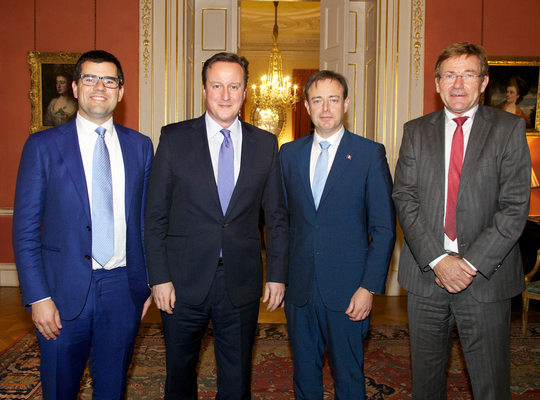You are here
Europe and the United Kingdom: stronger together

The European Council reached an agreement on the UK reform agenda. Now, Prime Minister David Cameron has to present this deal to the British people, since it is up to the British, and only the British to decide. Will Great Britain remain a member of the EU?
MEP Sander Loones (N-VA, Flanders/Belgium) is satisfied with the deal: "These last days sturdy statements have been made by various heads of government. More important is that, next to this external profiling, a good job has been delivered behind the scenes. My party, the Flemish N-VA party, has also addressed its network in order to help achieve this agreement. The fact that the Belgian Prime Minister was very outspoken during the negotiations, but in the end also agreed to the deal and asked for no vetoes, shows that everyone realizes that an EU without the UK would be a weaker player on the world stage. A British departure would certainly weaken the Union internally."
Britain is the second largest EU economy and contributes about 16% to the total GDP The gross domestic product (GDP) is the total monetary value of all goods and services produced within a country, both by companies and the government. This term is usually used as a benchmark for a country’s prosperity. This is why the N-VA closely follows the evolution of the Belgian GDP. GDP . It is next to France the only strong European military power, very important in geopolitical terms. The combination of their economic strength and their political ideas make the British an important partner.
"With their focus on free market and the importance they attach to a key role for Member States and regions in the EU, London is an essential counterweight to the interventionist focus of Paris and the federalising focus of Berlin," Loones continues. "By going along with the demands of the UK, this agreement provides a solid basis for Mr. Cameron to start his referendum battle."
A missed opportunity
It is clear that this agreement focuses strongly on the position of the United Kingdom in the European Union, and less on achieving a more efficient Union for all Member States. Loones: "That's a missed opportunity. Three years ago, David Cameron held his famous Bloomberg speech. He argued that the EU needed to be thoroughly reformed, hoping thereby to open a European debate. Unfortunately, the other Member States have not seized the opportunity. But those who think that calls for strong reforms and for a more efficient EU have faded away with this agreement, are wrong. And those who think that any move towards a totally integrated European superstate, with the UK on the sidelines, is the way forward, are ignoring reality." Not only in Britain the current state of the EU is causing a drop in the popular support for the Union. Also in countries like the Netherlands, France, Poland, Denmark and Italy, people look in a different way to the EU. N-VA aims for an EU guided by realism, where EU's problems are identified and tackled.
Important reforms
This agreement could have gone further to serve all Member states needs, but contains in any case important reforms for Great Britain. More attention to the Competitiveness The extent to which companies in one country can compete with similar companies in another country. A law came into force in Belgium in 1996 to monitor competitiveness. This stipulates that Belgian salaries may not evolve faster than the average of those in the three neighbouring countries. The Central Economic Council (CEC) performs an annual measurement to see if the objectives have been obtained. competitiveness of the EU, e.g. less administrative burdens for businesses. A 'red card´, that gives more power to national parliaments. And for the first time serious measures can be taken concerning the free movement of EU citizens, in order to tackle abuses. Loones: "We couldn't discuss topics like these for a long time. Until now, thanks to Mr. Cameron. But this is not the beginning of the end, it is the beginning of introducing the highly needed reforms. More work needs to be done. This is only a first serious step to a fundamental modernization of the EU. In Belgium, we will also need to see how we can use every opportunity provided by this agreement. In particular, we need to consider how to restrict Social security Social security is currently managed at the Federal level in Belgium. The most important pillars of Belgian social security are: sickness and invalidity insurance (NIDHI), pensions, unemployment insurance and child allowances. In addition, occupational illness, occupational accidents and annual holidays are dealt with at this level. Some Flemish parties have been campaigning for years for (large parts of) social security to be transferred to the Regions and Communities. social security migration and how to restrict family benefits for children not living with their parents, but in other countries with a cheaper living standard."
A notable element in the Belgian debate the last couple of days, has been the position of the PS (Parti Socialiste, Wallonia/Belgium). "If the PS would have been in Belgian government, Belgium would have used its veto. This government, with N-VA in it, has not blocked the deal. It strikes me that the PS would prefer siding with Greece, a country on the verge of bankrupcy, instead of siding with Cameron, the Prime Minister of one of Europe´s economic engines. It is obvious that a Schengen area without Greece would be a stronger Schengen area. And a European Union without Britain would be a weaker Union," concludes Loones.

